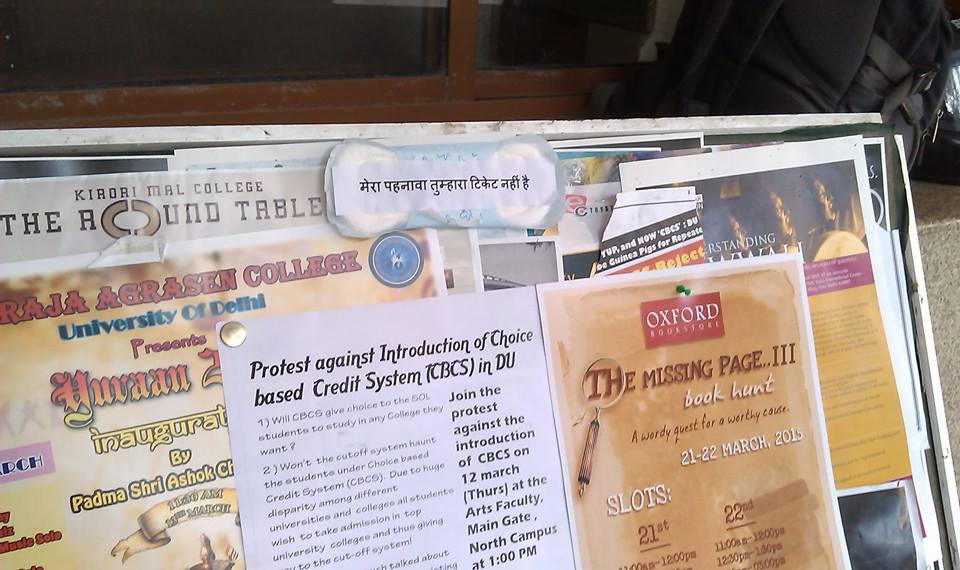Sanitary napkin sales have been shooting up around colleges in Delhi, thanks to a public art project inspired by German artist Elone. On International Women’s Day on March 8, Elone scribbled feminist messages on sanitary pads and put them up all over Karlsruhe city. Students of various colleges in Delhi have taken up the challenge, and have covered campus walls and trees with statements on gender equality.

An image from Elone’s campaign.
Students of the Jamia Millia Islamia university made the first move on March 12. “We were really impressed with what happened in Germany and decided to do the same thing on our campus,” said a student activist on the condition of anonymity. The campaign hopes to bust taboos about menstruation and target the larger culture of misogyny. The messages include ‘Streets of Delhi belong to women too’, ‘Rapists rape people, not outfits’, and ‘Period blood is not impure, your thoughts are’.
“It’s not just students ‒ educated people, including teachers, tend to view menstruation as something unnatural and despicable,” the activist said. “We want to send a message that sexism cannot and will not be tolerated.”
Easier said than done. Jamia officials took down the pads, which were put up by the students without permission. The students are undeterred, and took the campaign outside the campus and onto the streets of Delhi. “We expected some opposition but this was a shock,” said another student, who had spent a whole day putting up the pads, on the condition of anonymity. “We are going to take the message forward to the city until the hostility ends.”
Meanwhile on Friday, a group of students from the University of Delhi showed their solidarity by putting up similar revolutionary pads across the North Campus area. “We simply want people to understand that menstruation is not a crime and a girl should not be victimised for something so natural,” said Rafiul Alom Rahman, who initiated the campaign at DU. “We put feminist messages on the pads even though we knew that people will not be okay with seeing sanitary pads with red paint.”
DU officials, and possibly some students, also did not approve of the campaign. Some of the pads were found to be torn, while others were pulled off trees. “A security guard pulled a pad out of his pocket and asked me to put it somewhere else,” Rahman said. “We are not going to be cowed down. We are thinking of ways to make this campaign even bigger and involve other universities and students.”
Here are some photographs of the public art campaign from social media.

An image from Elone’s campaign.
Students of the Jamia Millia Islamia university made the first move on March 12. “We were really impressed with what happened in Germany and decided to do the same thing on our campus,” said a student activist on the condition of anonymity. The campaign hopes to bust taboos about menstruation and target the larger culture of misogyny. The messages include ‘Streets of Delhi belong to women too’, ‘Rapists rape people, not outfits’, and ‘Period blood is not impure, your thoughts are’.
“It’s not just students ‒ educated people, including teachers, tend to view menstruation as something unnatural and despicable,” the activist said. “We want to send a message that sexism cannot and will not be tolerated.”
Easier said than done. Jamia officials took down the pads, which were put up by the students without permission. The students are undeterred, and took the campaign outside the campus and onto the streets of Delhi. “We expected some opposition but this was a shock,” said another student, who had spent a whole day putting up the pads, on the condition of anonymity. “We are going to take the message forward to the city until the hostility ends.”
Meanwhile on Friday, a group of students from the University of Delhi showed their solidarity by putting up similar revolutionary pads across the North Campus area. “We simply want people to understand that menstruation is not a crime and a girl should not be victimised for something so natural,” said Rafiul Alom Rahman, who initiated the campaign at DU. “We put feminist messages on the pads even though we knew that people will not be okay with seeing sanitary pads with red paint.”
DU officials, and possibly some students, also did not approve of the campaign. Some of the pads were found to be torn, while others were pulled off trees. “A security guard pulled a pad out of his pocket and asked me to put it somewhere else,” Rahman said. “We are not going to be cowed down. We are thinking of ways to make this campaign even bigger and involve other universities and students.”
Here are some photographs of the public art campaign from social media.







Picture credits: Jamiajournal, Rafiul Alom Rahman and Shambhawi Vikram.
Scroll has produced award-winning journalism despite violent threats, falling ad revenues and rising costs. Support our work. Become a member today.

In these volatile times, Scroll remains steadfastly courageous, nuanced and comprehensive. Become a Scroll Member and support our award-winning reportage, commentary and culture writing.
